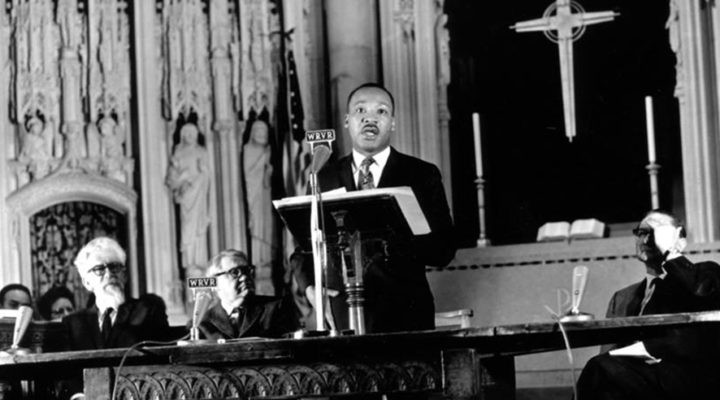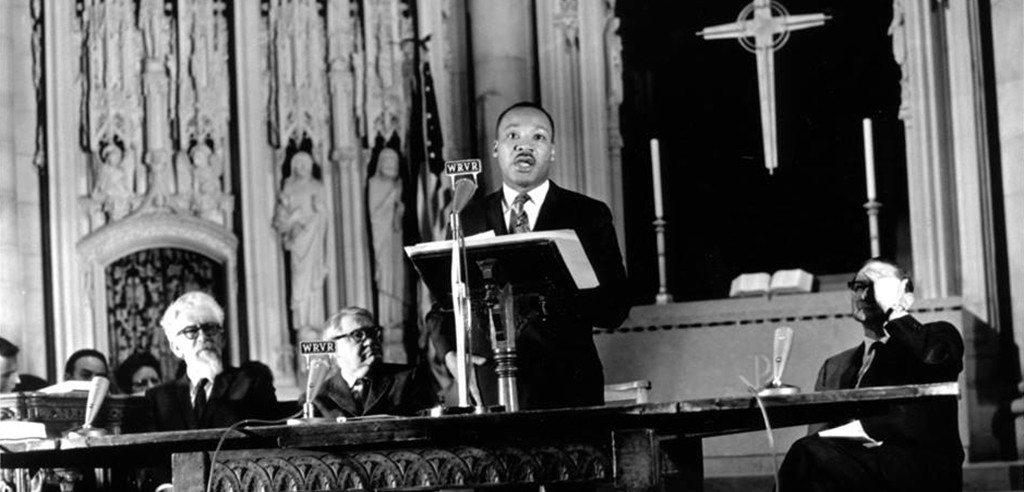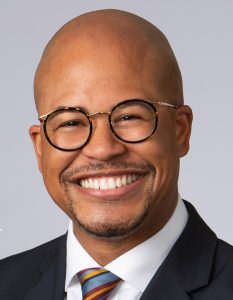The year was 1967. The United States was in the middle of the Vietnam War. Many citizens wondered why troops were sent there and exactly why they were fighting. In this year, many Black and brown individuals raised their voices, crying out to their own country, dismayed of being sent away to fight.
You may remember it was in this same year that Muhammed Ali was convicted for refusing to fight in the war. He asked, “Why should they ask me to put on a uniform and go 10,000 miles from home and drop bombs and bullets on brown people in Vietnam while so-called (Black) people in Louisville are treated like dogs?”
It was this same year that Martin Luther King Jr. stood in the pulpit of the Riverside Church in New York City to deliver one of the most memorable speeches of his career, “Beyond Vietnam: A Time to Break Silence.” In this powerful address, King speaks out against the Vietnam War, asserting that the United States’ involvement in the conflict is immoral and unjust. He connects the war to broader issues of poverty, racial inequality and the need for social justice.
King emphasizes his opposition to the war is rooted in his commitment to non-violence, human rights and peace. He argues the U.S. government should redirect its resources from military violence abroad to addressing the systemic inequalities and domestic needs at home. King calls for the American public to break their silence and take a stand against the war, highlighting the moral responsibility to speak out against injustice, both abroad and at home.
If you never have listened to or read the speech, it is worth your time. In a portion of the speech King states:
“We are now faced with the fact, my friends, that tomorrow is today.”
For the sake of those boys, for the sake of this government, for the sake of the hundreds of thousands trembling under our violence, I cannot be silent. … We are now faced with the fact, my friends, that tomorrow is today. We are confronted with the fierce urgency of now. In this unfolding conundrum of life and history, there is such a thing as being too late. Procrastination is still the thief of time. Life often leaves us standing bare, naked and dejected with a lost opportunity. The tide in the affairs of men does not remain at flood — it ebbs.
We may cry out desperately for time to pause in her passage, but time is adamant to every plea and rushes on. Over the bleached bones and jumbled residues of numerous civilizations are written the pathetic words, “Too late.” There is an invisible book of life that faithfully records our vigilance or our neglect.
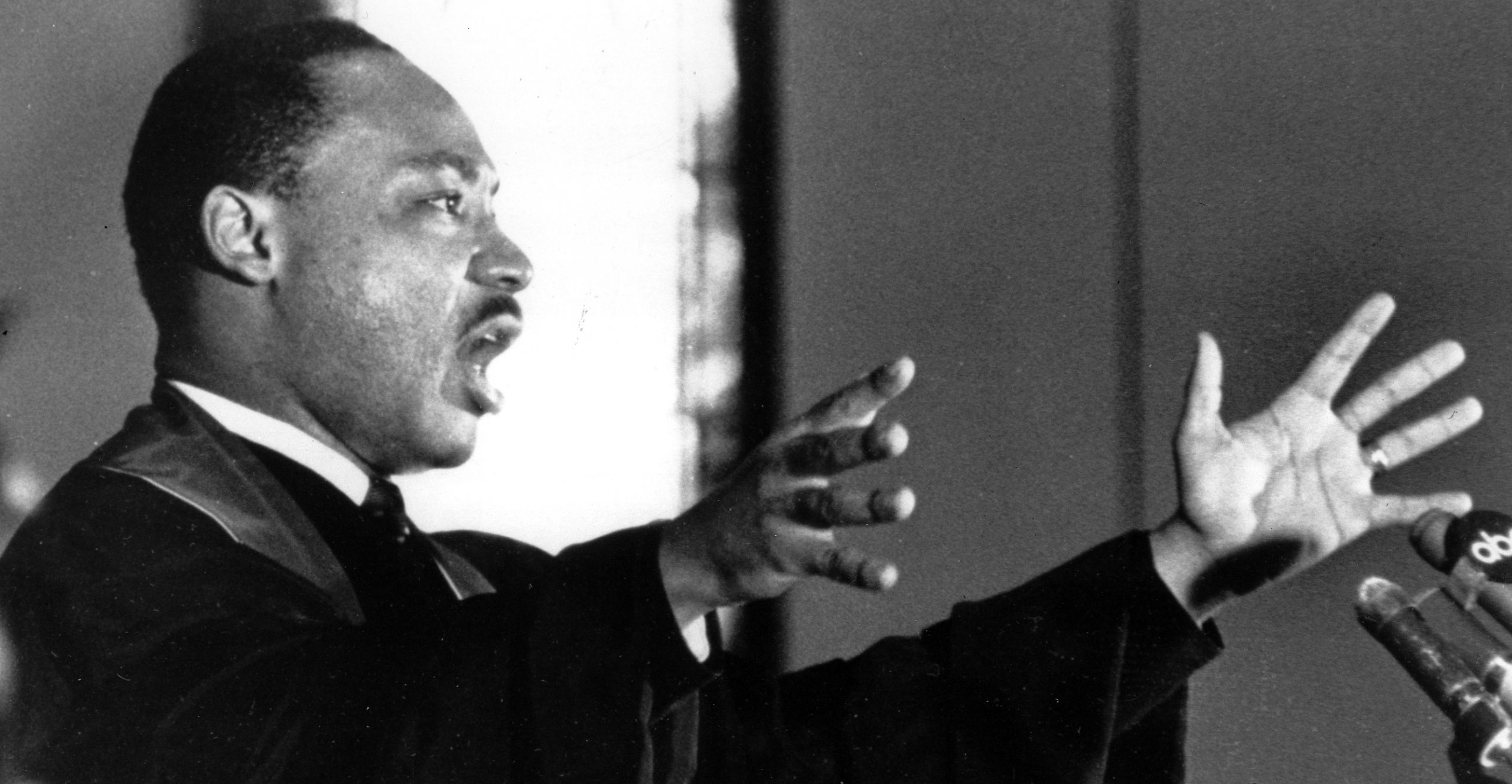
Martin Luther King Jr. gestures to his congregation in Ebenezer Baptist Church in Atlanta, Ga.., on April 30, 1967 as he urges America to repent and abandon what he called its “Tragic, reckless adventure in Vietnam.” (AP Photo)
MLK and Isaiah
The prophet Isaiah knows a little bit of what King is talking about — or should I say vice versa. In Isaiah 62:1 we read: “For Zion’s sake I will not keep silent, and for Jerusalem’s sake I will not rest, until her vindication shines out like the dawn, and her salvation like a burning torch.”
Earlier, in the second section of Isaiah, we learn that around the year 539, King Cyrus of Persia proclaimed an end to the Jewish exile. It is in this same portion where God promises the people they wouldn’t be back to normal but would be better than what was before.
However, the reality the people faced was not yet that. While some remained in Judah for all the years of exile, others were taken away from their homeland. But the work of 50 to 60 years done by those in power could not be undone.
“The work of 50 to 60 years done by those in power could not be undone.”
This is why the people were filled with lament. And today we must not rush past that reality to get to the glory at the end of the passage, but we sit in lament because too often we rush past Good Friday to get to Easter. Far too often we do not understand the pain within us, within the community, within the country, within the land itself.
We neglect when life feels like a desert and say it will be just fine. Sometimes we must sit in the place of lamentations and be honest with how we feel.
As one scholar notes: “Isaiah’s lamentation fits with the complications of life. After the joy of Christmas and the hope of the turn of the year have faded, we notice that life hasn’t changed. God still seems far away at times. Corruption and evil seem just as strong and intractable. The church seems as divided. Lamentation expresses the longing between what Advent and Christmas promise and the reality we encounter.”
The chapter begins with an unknown and unnamed speaker. Some suggest it is God speaking to the people to give them reassurance, but it is more likely this portion of the passage is being spoken by the unknown prophet. This prophet is determined to speak a message until righteousness and salvation prove themselves.
While the entirety of the passage is worth a deep dive and moves the people out of their lament, I cannot find myself moving too quickly away from the first verse: “I will not keep silent. I will not rest.”
‘I will not rest’
It is important we as Christian people follow the prophet’s command and do the same: Proclaiming we will resist the urge to be silent about things that matter. We cannot be silent when, just as Martin Luther King argued in the 1960s, we are sending resources abroad that are destroying entire populations while failing to address systemic inequalities and domestic needs here in the U.S. We are confronted with the fierce urgency of now.
I recognize that silence is a self-discipline and solitude is an act we must observe, but when it comes to injustice, silence is not the practice we must observe.
For liberation to be obtained, we must speak and act and never procrastinate. You must ask yourself if our silence is worth the lamentations and hardships of others.
Is your silence abandoning others because the injustice, harm and decrees from those in power do not affect you? There is a danger in silence and a danger of removing ourselves
“Your silence does a real harm, and your inaction is a real danger and threat to this society.”
Your silence does a real harm, and your inaction is a real danger and threat to this society.
I believe King understood the prophet when he said, “There comes a time when silence is betrayal.” And, “Our lives begin to end the day we become silent about things that matter.” And, “In the end, we will remember not the words of our enemies, but the silence of our friends.”
May today be the day you say: “I will not keep silent. I will not rest.”
A rabbi’s prophetic words

Leaders of the March on Washington gather in front of the statue of Abraham Lincoln inside the Lincoln Memorial in Washington, D.C., August 28, 1963. From left to right, they are Mathew Ahmann (1931 – 2001), Cleveland Robinson (1914 – 1995), Joachim Prinz (1902 – 1988), Philip Randolph (1889 – 1979), Joseph Louis Rauh Jr. (1911 – 1992), John Lewis (1940 – 2020), and Floyd McKissick (1922 – 1991). (Photo by National Archives/Interim Archives/Getty Images)
The year was 1963. He went up to the podium and stared out at the sea of people. Odetta had just sung “Oh, Freedom,” the people were stirred up and ready for a word from MLK Jr., but before he was ready to speak, the Rabbi Joachim Prinz took the podium. Prinz devoted much of his life in the United States to the Civil Rights Movement.
While serving as president of the American Jewish Congress, he represented the Jewish community as an organizer of the March on Washington, which is where he is now to speak. And he stated:
When I was the rabbi of the Jewish community in Berlin under the Hitler regime, I learned many things. The most important thing that I learned under those tragic circumstances was that bigotry and hatred are not the most urgent problem. The most urgent, the most disgraceful, the most shameful and the most tragic problem is silence.
A great people which had created a great civilization had become a nation of silent onlookers. They remained silent in the face of hate, in the face of brutality and in the face of mass murder.
America must not become a nation of onlookers. America must not remain silent. It must speak up and act, from the president down to the humblest of us, for the sake of the image, the idea and the aspiration of America itself.
Our children, yours and mine in every school across the land, each morning pledge allegiance to the flag of the United States and to the republic for which it stands. They, the children, speak fervently and innocently of this land as the land of “liberty and justice for all.”
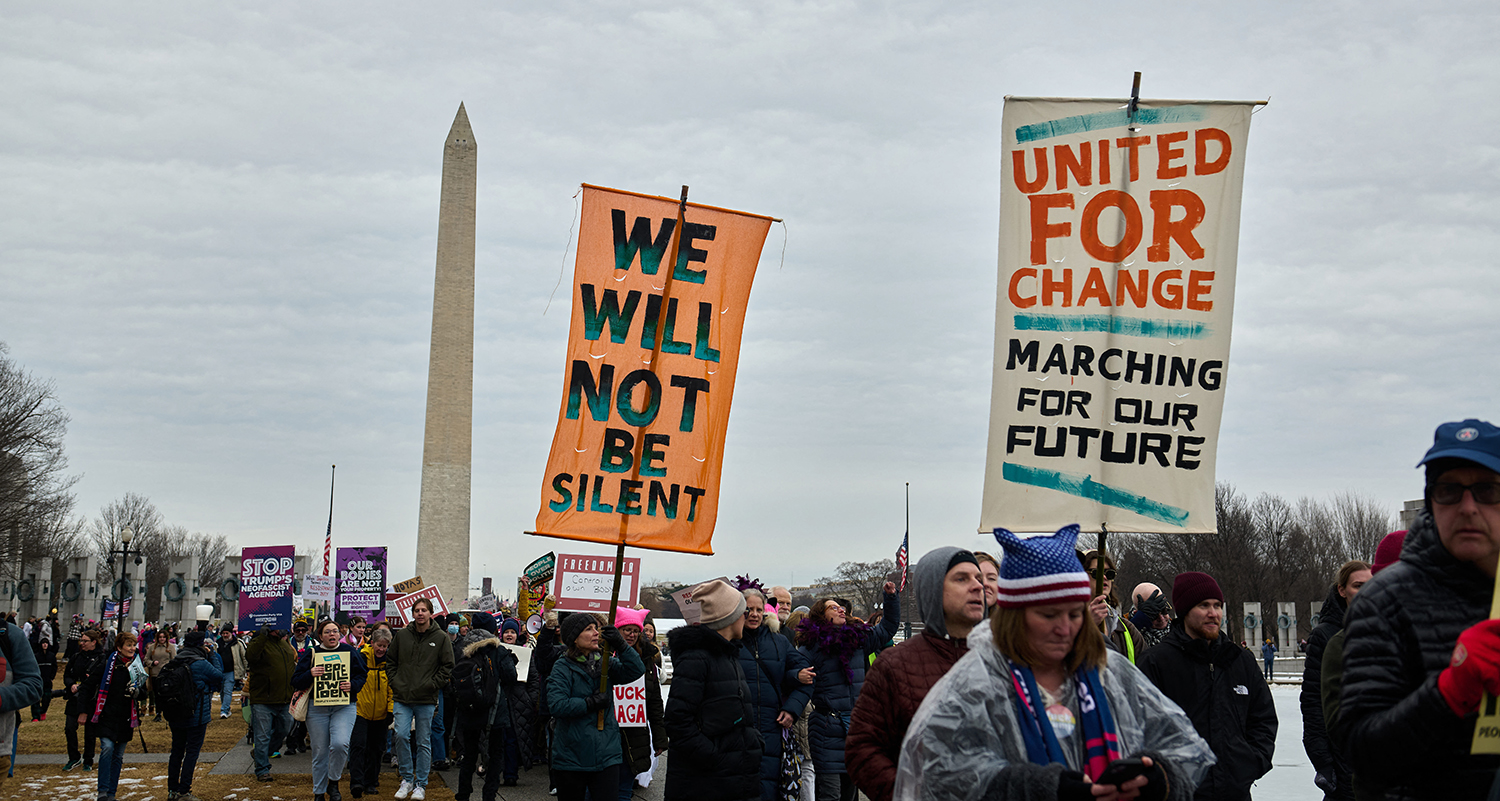
Thousands descend on Washington, D.C., to protest the second inauguration of Donald Trump, Saturday, January 18, 2025. (Photo by DOMINIC GWINN/Middle East Images/AFP via Getty Images)
January 20, 2025
Tomorrow is not just MLK day but also Inauguration Day, when a new administration begins. There are many excited Americans and millions who lament, fearful of what the next four years will bring and who will bear the cost. No matter the politician, no matter the party, to echo the prophet’s words: For the sake of our land, I won’t keep silent. We have a priority to make sure the words the children speak come to fruition — “liberty and justice for all.”
For the sake of women, I won’t keep silent. As women’s bodies are being litigated and legislated. As churches and leaders silence women’s voices.
For the sake of our trans siblings, I won’t keep silent. As hate and misinformation is spread at their expense.
For the sake of the LGBTQ community, I won’t keep silent. As their rights are taken away because people choose to fear rather than to educate.
For the sake of the children, I won’t keep silent. As they learn how to hide in schools while adults are unable to regulate and legislate a gun that can lead to death but words on paper are regulated and legislated, book bans happening for fear of what can come from words.
“For the sake of our land, I won’t keep silent.”
For the sake of Black and brown people, I won’t keep silent. Still being used as pawns, bodies beaten, brutality and myths still pervading the system.
For the sake of immigrants, I won’t keep silent. The tired and weary, fleeing violence, working hard and doing jobs many of us would never imagine taking, to better our country, many who have lived their entire lives in America. And at night, attending classes to prepare for what to do if they’re taken away by ICE while their children are at school.
For the sake of prisoners, I won’t keep silent. Who sit in a system that is more closely related to slavery than to rehabilitation. We use them to fight fires for around $10 a day but sadly refuse to see them as human beings worthy of second chances.
For the sake of the earth, I won’t keep silent. As she blazes and cries and floods and we forget God’s command to take care of her.
For the sick unable to receive medical assistance because of the cost. For the struggling to get by when minimum wage is nothing in a rising economy. For those experiencing hunger, poverty. I will not keep silent.
Because that is not the best we can do. And because God calls us to more. God calls us not keep silent.
I know you heard the quote, “First they came for the socialists and I did not speak. Then they came for the trade unionists, and I did not speak. And then they came for the Jews, and I did not speak. And then they came for me, and there was no one left to speak for me.”
We must speak.
We must act.
We must not keep silent.
Timothy Peoples serves as senior pastor of Wilshire Baptist Church in Dallas. He serves on BNG’s board of directors.
This column was adapted from a sermon preached Sunday, Jan. 19, which may be viewed here.
Related articles:
What you haven’t been taught about Martin Luther King
More than a dream: The undiluted legacy of Martin Luther King Jr. | Opinion by Joel Bowman
A memo from 1968 to today’s Christian parents: Teach your children well | Opinion by Mark Wingfield

